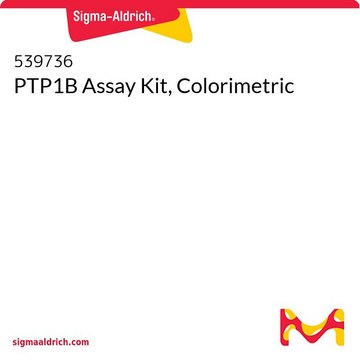17-125
PTP Assay Kit 1
PTP Assay Kit 1 can be used to detect PTP-1B activity by dephosphorylation of the phosphopeptide (RRLIEDAEpYAARG) using malachite green detection, or by hydrolysis of pNPP.
Zaloguj sięWyświetlanie cen organizacyjnych i kontraktowych
About This Item
Kod UNSPSC:
12161503
eCl@ss:
32161000
NACRES:
NA.84
Polecane produkty
Poziom jakości
producent / nazwa handlowa
Upstate®
metody
activity assay: suitable (phosphatase)
numer dostępu NCBI
numer dostępu UniProt
metoda wykrywania
colorimetric
Warunki transportu
wet ice
informacje o genach
human ... PTPN1(5770)
Zastosowanie
PTP Assay Kit 1 can be used to detect PTP-1B activity by dephosphorylation of the phosphopeptide (RRLIEDAEpYAARG) using malachite green detection, or by hydrolysis of pNPP.
Used to detect/quantify: PTP
Opakowanie
Kit capacity: 100 assays
Komponenty
Tyrosine Phosphopeptide (RRLIEDAEpYAARG] (Cat.# 12-217)
Malachite Green Solution A (Cat.# 20-105)
Malachite Green Additive (Cat.# 20-104)
Phosphate Standard (Cat.# 20-103)
pNPP (p-Nitrophenyl Phosphate) (Cat.# 20-106)
pNPP Tyr Assay Buffer (Cat.# 20-180)
96-well microtiter plate
Malachite Green Solution A (Cat.# 20-105)
Malachite Green Additive (Cat.# 20-104)
Phosphate Standard (Cat.# 20-103)
pNPP (p-Nitrophenyl Phosphate) (Cat.# 20-106)
pNPP Tyr Assay Buffer (Cat.# 20-180)
96-well microtiter plate
Jakość
routinely evaluated by malachite green and pNPP hydrolysis assays to detect PTP-1B (Catalog # 14-109 or Catalog # 14-358) activity by dephosphorylation of the phosphopeptide
Informacje prawne
UPSTATE is a registered trademark of Merck KGaA, Darmstadt, Germany
Oświadczenie o zrzeczeniu się odpowiedzialności
Unless otherwise stated in our catalog or other company documentation accompanying the product(s), our products are intended for research use only and are not to be used for any other purpose, which includes but is not limited to, unauthorized commercial uses, in vitro diagnostic uses, ex vivo or in vivo therapeutic uses or any type of consumption or application to humans or animals.
Ta strona może zawierać tekst przetłumaczony maszynowo.
Hasło ostrzegawcze
Warning
Zwroty wskazujące rodzaj zagrożenia
Zwroty wskazujące środki ostrożności
Klasyfikacja zagrożeń
Aquatic Chronic 3 - Met. Corr. 1
Kod klasy składowania
8A - Combustible corrosive hazardous materials
Certyfikaty analizy (CoA)
Poszukaj Certyfikaty analizy (CoA), wpisując numer partii/serii produktów. Numery serii i partii można znaleźć na etykiecie produktu po słowach „seria” lub „partia”.
Masz już ten produkt?
Dokumenty związane z niedawno zakupionymi produktami zostały zamieszczone w Bibliotece dokumentów.
Wenbin Xiao et al.
Blood, 116(26), 6003-6013 (2010-09-23)
Hyperactivation of the transcription factor Stat5 leads to various leukemias. Stat5 activity is regulated by the protein phosphatase SHP-1 in a phospholipase C (PLC)-β3-dependent manner. Thus, PLC-β3-deficient mice develop myeloproliferative neoplasm, like Lyn (Src family kinase)- deficient mice. Here we
J Xu et al.
Immunity, 1(5), 423-431 (1994-08-01)
To study the potential roles of CD40L in immune responses, we generated CD40L-deficient mice by gene targeting. Similar to the effects of CD40L mutations in humans (hyper-IgM syndrome), CD40L-deficient mice have a decreased IgM response to thymus-dependent antigens, fail altogether
Tamer Ahmed et al.
American journal of physiology. Gastrointestinal and liver physiology, 291(1), G35-G44 (2006-04-01)
Growth hormone (GH) stimulates STAT5 phosphorylation by JAK2, which activates IGF-I and serine protease inhibitor 2.1 (Spi 2.1) transcription, whereas STAT5 dephosphorylation by protein tyrosine phosphatases (PTPs) terminates this signal. We hypothesized that the inhibitory effects of TNF on GH
P A Ram et al.
The Journal of biological chemistry, 272(28), 17694-17702 (1997-07-11)
Growth hormone (GH) rapidly stimulates tyrosine phosphorylation followed by serine/threonine phosphorylation of multiple cytoplasmic STAT transcription factors, including one, STAT5b, that is uniquely responsive to the temporal pattern of plasma GH stimulation in rat liver and is proposed to play
Involvement of Src-homology-2-domain-containing protein-tyrosine phosphatase 2 in T cell activation.
P Tailor et al.
European journal of biochemistry, 237(3), 736-742 (1996-05-01)
Activation of resting T lymphocytes by ligands to the complex of T cell antigen receptor (TCR) and CD3 is initiated by a series of critical tyrosine phosphorylation and dephosphorylation events. Protein-tyrosine kinases of the Syk, Src and Csk families and
Nasz zespół naukowców ma doświadczenie we wszystkich obszarach badań, w tym w naukach przyrodniczych, materiałoznawstwie, syntezie chemicznej, chromatografii, analityce i wielu innych dziedzinach.
Skontaktuj się z zespołem ds. pomocy technicznej





